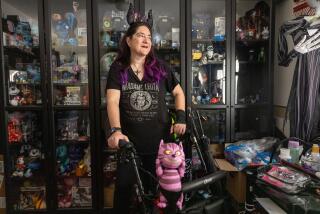When All Things Are Not Equal . . . : Coping: Despite laws, inequities abound for disabled, who are weary of fighting for their rights.
Something was missing from the recent celebrations of Dr. Martin Luther King Jr.’s birthday. How does a community and a nation honor someone who gave his life in the fight for equality without mentioning last year’s passage of major civil rights legislation?
The Americans with Disabilities Act, signed into law by President Bush on July 26, was the most comprehensive piece of civil rights legislation to be passed since 1964. Yet few non-disabled Americans know about the law or even have an idea of what “disability rights or discrimination” are. Tiny Tim and telethons are too often what come to mind.
But until the public achieves a better understanding of the disabled community and the new law, some members of our society will continue to face discrimination in jobs, housing, commerce and travel.
Examples of the discrimination abound in everyday life--in the basic things that most people take for granted. At the grocery store for instance, disabled individuals have trouble getting into many supermarkets without permission of store personnel. You see, the gates that prevent carts from “escaping,” also prohibit many disabled shoppers from entering.
Fair housing didn’t apply to disabled individuals until 1989. Imagine after finding that needle-in-a-haystack apartment that is marginally accessible and meets your financial constraints, you are denied occupancy because “your presence may make our other tenants uncomfortable.” This was a regular occurrence in San Diego and elsewhere, and, although it is now illegal, it still occurs.
Disabled travelers gained “access to the skies” in 1986 with the passage of the Air Carriers Access Act. In theory, we would never again need to worry that we would be denied a seat on a plane because of our disability. But just last month, one of the leaders in the disability rights community was denied access to a flight. When he arrived at the gate, airline personnel were unable to determine proper procedure for accommodating his respirator, even though he had flown the airline before.
In 1974, disabled children gained the right to a quality education, and, since 1984, disabled adults have been guaranteed the right to vote, not because we are Americans and all Americans have these rights, but because the disabled community organized to assure the rights that had been denied us were written into law.
Like Rosa Parks, the black woman who said she took a forbidden seat in the front of an Alabama bus in the early 1960s because “I was tired,” we too are tired of fighting for each individual, basic right: education in 1974, federally funded programs in 1977, voting rights in 1984, air transportation in 1986, housing in 1989, public transportation in 1990.
We hope that the Americans with Disabilities Act will now cover everything.
But these federal laws do not assure local compliance. Planning boards and enforcement agencies can undo with a simple waiver, or through ignorance, what it took us so long to do.
If San Diego County wants to be fair to all of its residents, this must change. There needs to be a commitment by elected leaders to make sure that the laws are observed. Businesses, employers and landlords must be educated about the disability rights laws. And the disabled community should not have to be the only ones on the lookout for violations.
It’s insulting to watch as those in positions of public trust, both elected and employed, take so lightly the laws that we have worked so hard to see enacted. For instance, in 1983, Seaport Village was built with 33 pages of access code violations--six years after the access laws were passed. Only when the disabled community pointed the violations out did the city enforce compliance.
There were similar problems with the San Diego Trolley. We were promised that it would be accessible for wheelchair users, but that requirement wasn’t implemented until the disabled community threatened to lie down on the tracks.
Somehow it seems that disabled individuals have nothing better to do than to patrol shopping centers and new buildings to look for violators. To sit on street corners to observe which streets really need curb cuts. Do disabled people really use that street?
Which offices do deaf individuals really need to communicate with?
Which bus routes are the most important to be made accessible?
Which polling places need to be accessible?
The answer is all of them.
Soon, the citizens of San Diego will have an advocate on the city staff to oversee enforcement of disability codes and laws. This should help.
But I dream of a day when the laws that are currently on the books are enforced to the full extent of the law by the people who are responsible for enforcing them, when the city allows no waivers on accessibility codes and when violators are prosecuted and made to pay restitution to the community they have injured.
I dream of the day when my friends are free to move about society, both through accessible transportation and through job opportunities.


